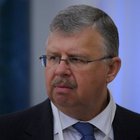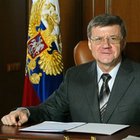Taking part in the meeting were First Deputy President of the Supreme Court and President of the Court Board for Administrative Affairs Pyotr Serkov, Director of the Federal Bailiffs Service and Chief Bailiff Artur Parfenchikov, Director of the Federal Customs Union Andrei Belyaninov, Director of the Federal Drug Control Service Viktor Ivanov and others.
Prosecutor General Yury Chaika reported on the results of law enforcement agencies’ efforts to fight corruption and on the measures needed to improve this work.
Mr Chaika said that the number of solved cases involving corruption-related activity carried out by organised groups or criminal groups increased by 41 percent. The quality of anti-corruption investigations also improved, with the number of cases sent back by the prosecutors for further investigation dropping by more than 15 percent.
Mr Chaika noted that international anti-corruption organisations have given a positive assessment of Russia’s efforts to implement the demands of international anti-corruption conventions.
Data from international NGO Transparency International, for example, shows that Russia has moved up several dozen points on the corruption perception index over the last three years. Sociological surveys conducted over 2010–2013 also show stable decline of corruption levels in Russia.
First Deputy President of the Supreme Court and President of the Court Board for Administrative Affairs Pyotr Serkov and Director of the Federal Bailiffs Service and Chief Bailiff Artur Parfenchikov reported on the use of fines as the main punishment for corruption-related crimes, with prison terms imposed in cases of persistent evasion of paying fines.
The number of cases in which fines were the main punishment for bribe-taking increased from 34 percent of cases in 2011, to 68 percent in 2013, and the number of cases in which suspended sentences or suspended execution of sentences were imposed dropped from 62 percent in 2011 to 18 percent in 2013.
According to the Federal Bailiffs Service, 1,100 cases were closed following effective payment of fines for corruption-related offences in 2013, which is more than double the figure for 2012 (522 cases).
First Deputy Prosecutor General Alexander Buksman reported on organising corruption prevention in state corporations, the Pension Fund, Social Insurance Fund, Federal Compulsory Medical Insurance Fund, and other organisations established by federal law, and also in organisations established to carry out federal state bodies’ set tasks.
Inspections conducted by the Prosecutor General’s Office showed that these organisations are not up to satisfactory standard when it comes to enforcing anti-corruption legislation. Measures taken to rectify the situation revealed by the inspections resulted in more than 100 protests being filed, 4 officials warned against tolerating any violations of the law, and more than 800 officials subjected to disciplinary penalties.
The number of cases of civil servants reporting attempts to incite them to commit a corruption-related offence has also increased. Director of the Federal Customs Service Andrei Belyaninov told the meeting that the Customs Service received 257 such reports in 2013, and 133 of them were confirmed upon inspection. By comparison, the Customs Service received only 52 such reports in 2012.

